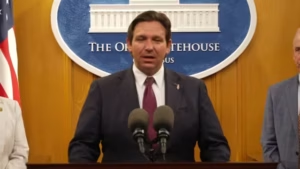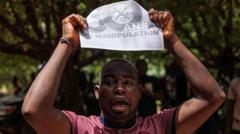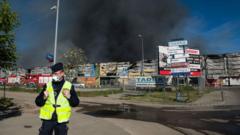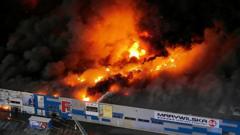As Poland prepares to choose its next president, the spotlight remains on the two leading candidates: Warsaw's liberal mayor Rafal Trzaskowski and national-conservative historian Karol Nawrocki. This election, scheduled for Sunday, could result in a second round between these two if no candidate secures over 50% of the votes. Trzaskowski currently enjoys a slight lead, backed by Prime Minister Donald Tusk's centre-right Civic Platform (PO), while Nawrocki trails behind, supported by the opposition Law and Justice (PiS) party. The significance of this election is underscored by the president's power to veto crucial government bills, a tactic previously employed by the outgoing President Andrzej Duda. With voters feeling the strain of continuous political dominance by PO and PiS, the outcome of this election is seen as critical to either reinvigorating democratic processes or entrenching existing political divides.
Poland Braces for Intense Presidential Showdown as Voter Fatigue Grows
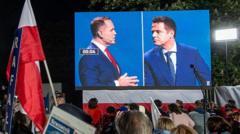
Poland Braces for Intense Presidential Showdown as Voter Fatigue Grows
Upcoming elections signal a critical moment for Polish politics as citizens express weariness of the longstanding political duopoly.
The race is tight as critical issues like migration, women's rights, and environmental protection have taken a backseat. Tusk's coalition, while promising reform, struggles with internal disagreements and past accusations of leveraging authority for control. Meanwhile, the political landscape has been marked by a rising polarisation between progressive and conservative values. Voters express dissatisfaction with a perceived lack of genuine choice, noting that the current political environment resembles a fast-food menu lacking diversity in options. As the nation embarks on this pivotal election, sentiments of frustration and disillusionment echo prominently among the electorate.
The electoral outcome remains unpredictable, with the possibility of a run-off igniting continued debate over the future path of Polish governance and societal values.
-----
Poles head to the polls this Sunday amidst a backdrop of political fatigue, with the two leading candidates poised for a competitive race. Rafal Trzaskowski represents the liberal opposition, while Karol Nawrocki is backed by the conservative ruling party. The election carries immense implications for the balance of power in Poland, challenging the long-standing political hegemony that many citizens are weary of enduring. As voters confront a limited choice between entrenched political ideologies, a significant debate about their democratic future looms.
The electoral outcome remains unpredictable, with the possibility of a run-off igniting continued debate over the future path of Polish governance and societal values.
-----
Poles head to the polls this Sunday amidst a backdrop of political fatigue, with the two leading candidates poised for a competitive race. Rafal Trzaskowski represents the liberal opposition, while Karol Nawrocki is backed by the conservative ruling party. The election carries immense implications for the balance of power in Poland, challenging the long-standing political hegemony that many citizens are weary of enduring. As voters confront a limited choice between entrenched political ideologies, a significant debate about their democratic future looms.


